Unit 9 Have you ever been to a museum知识过关表格式清单(含答案)
文档属性
| 名称 | Unit 9 Have you ever been to a museum知识过关表格式清单(含答案) | 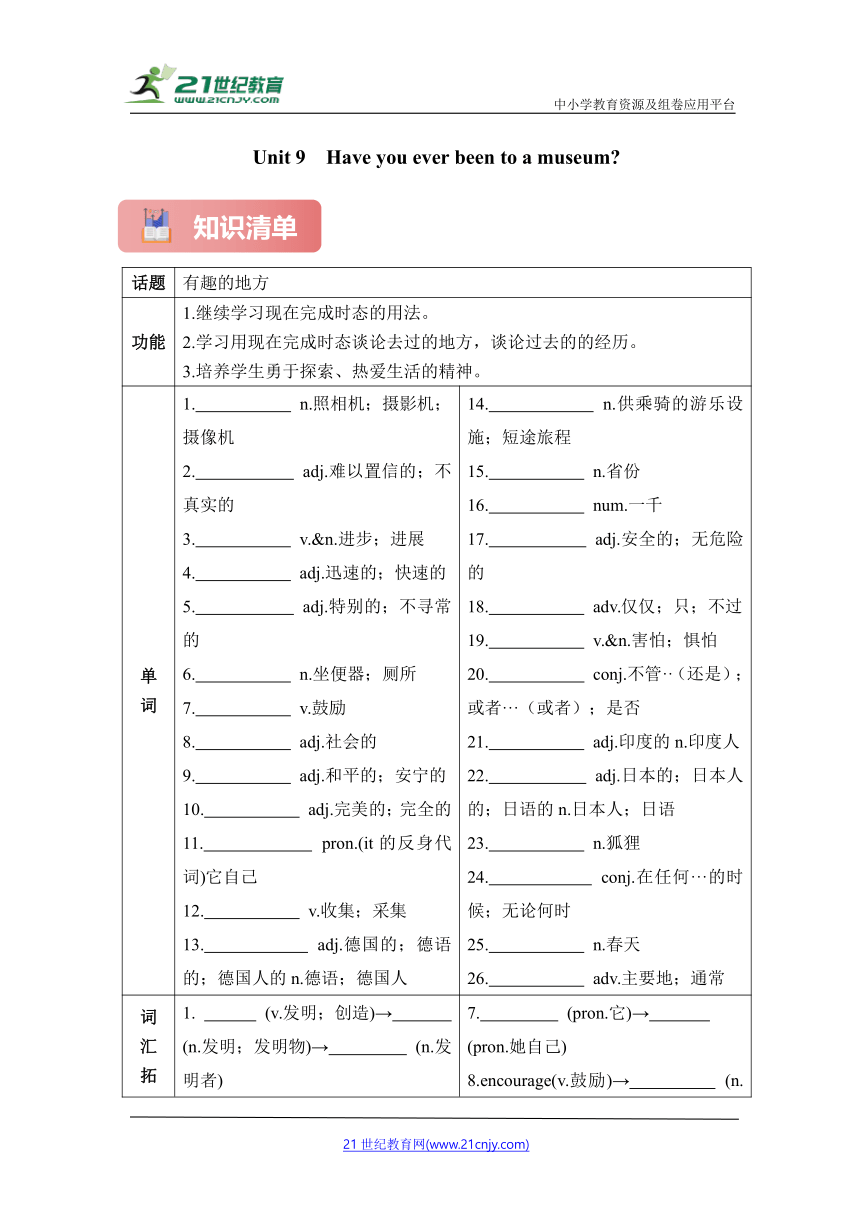 | |
| 格式 | docx | ||
| 文件大小 | 91.0KB | ||
| 资源类型 | 试卷 | ||
| 版本资源 | 人教新目标(Go for it)版 | ||
| 科目 | 英语 | ||
| 更新时间 | 2024-05-17 12:55:05 | ||
图片预览

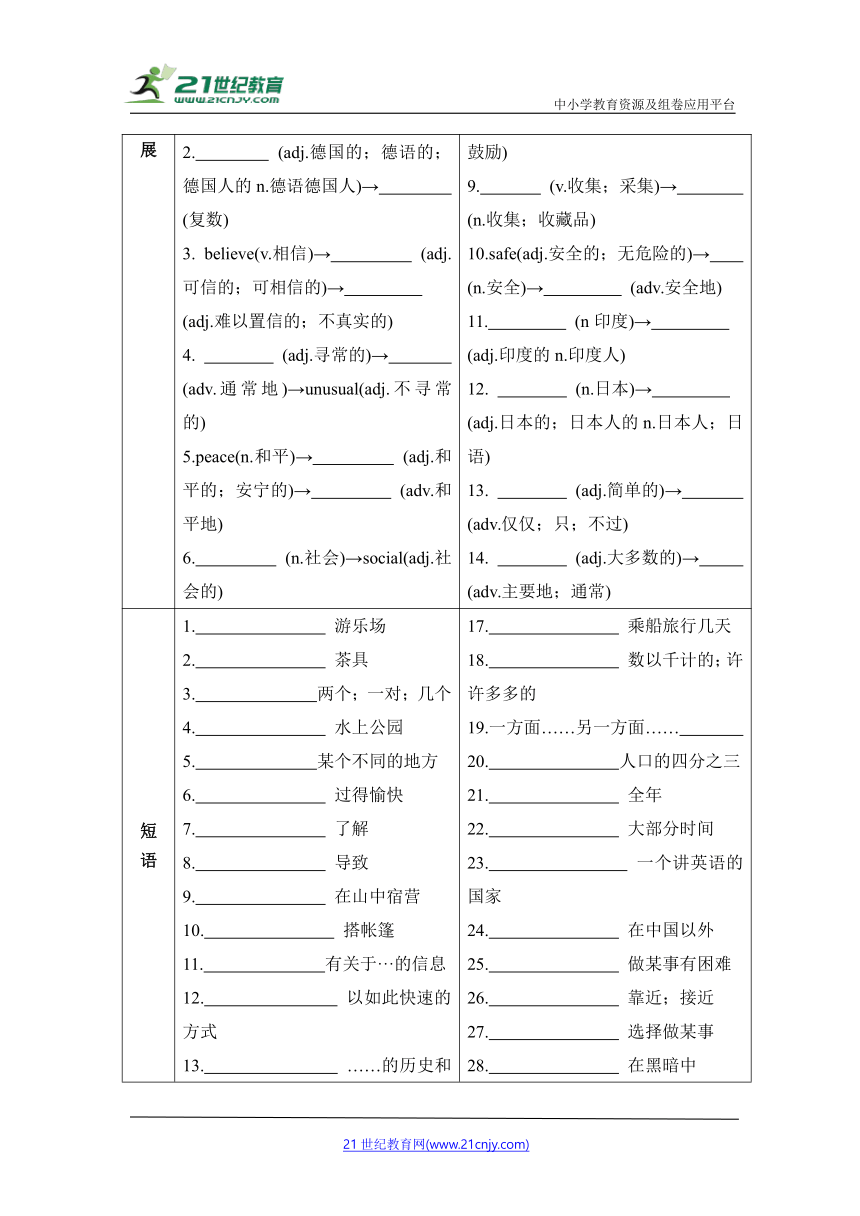
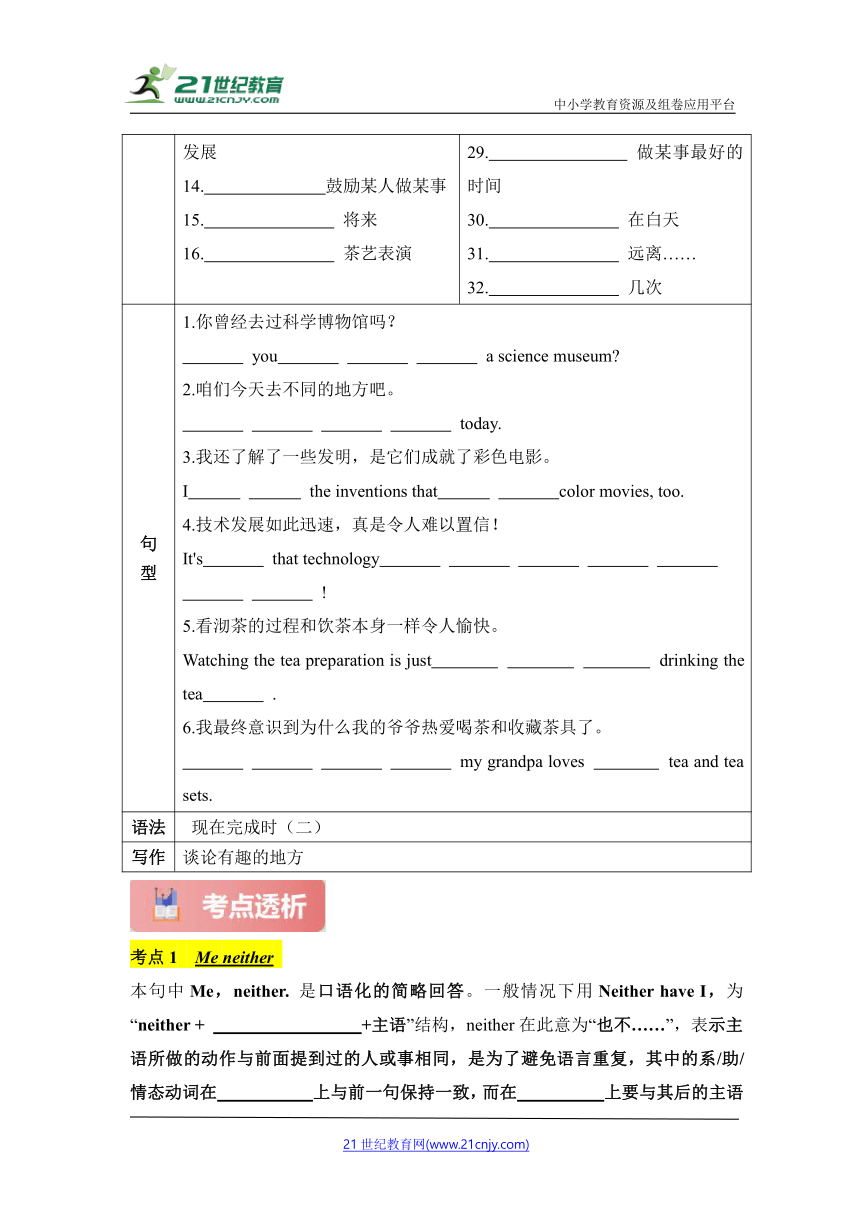
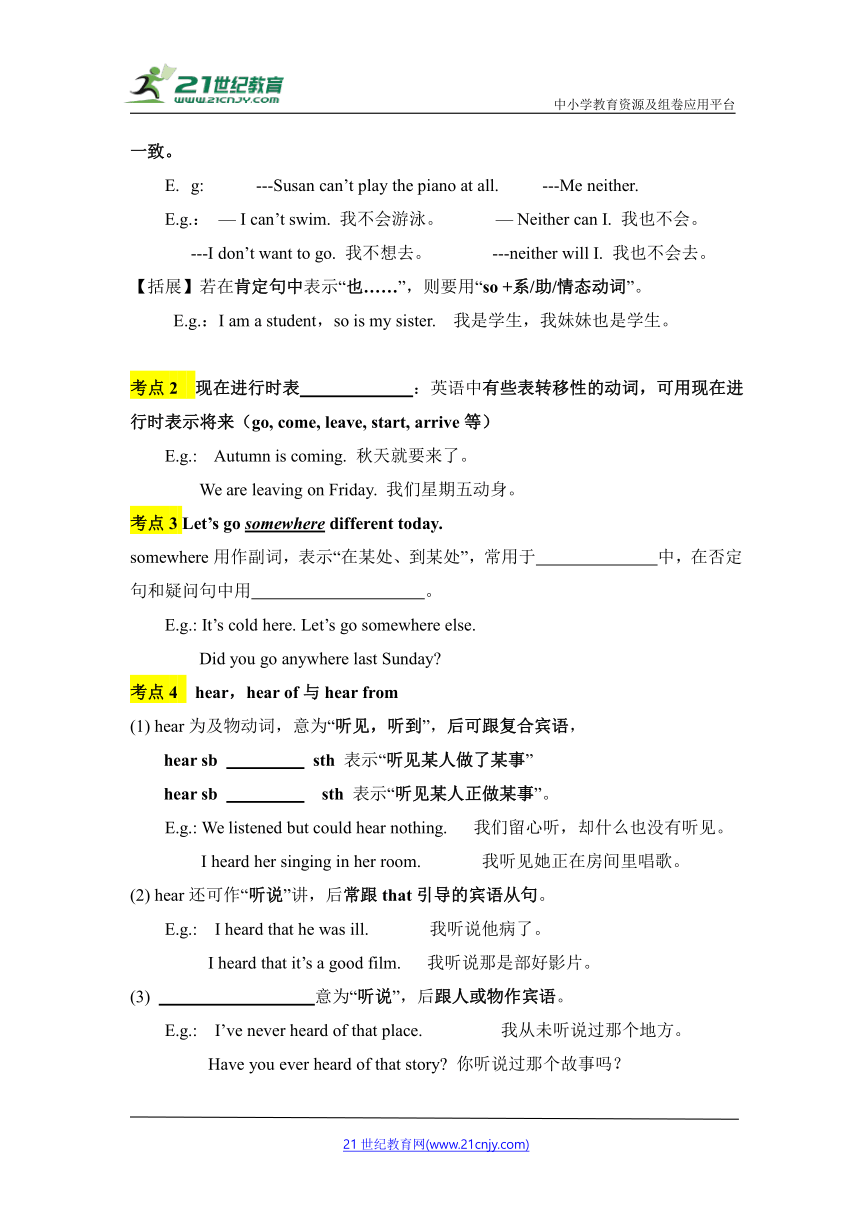
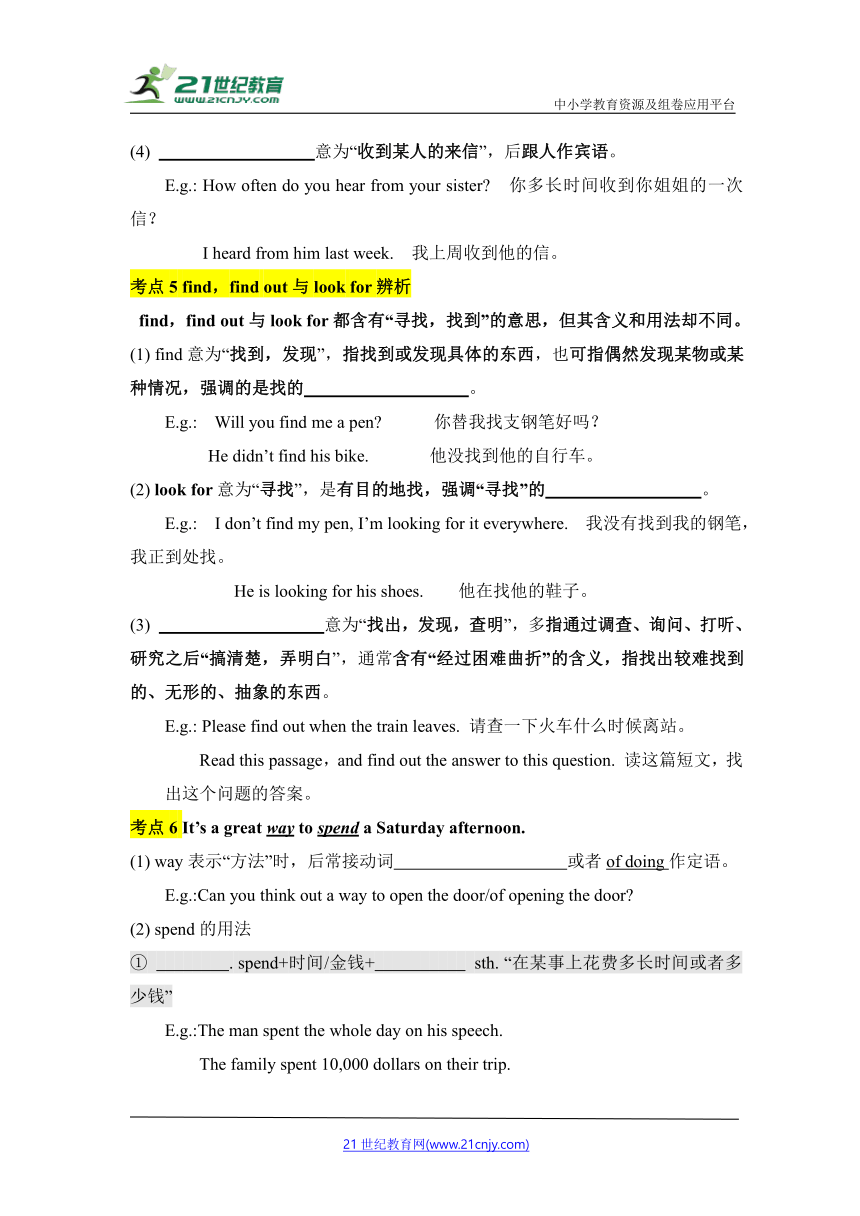
文档简介
中小学教育资源及组卷应用平台
Unit 9 Have you ever been to a museum
话题 有趣的地方
功能 1.继续学习现在完成时态的用法。 2.学习用现在完成时态谈论去过的地方,谈论过去的的经历。 3.培养学生勇于探索、热爱生活的精神。
单 词 1. n.照相机;摄影机;摄像机 2. adj.难以置信的;不真实的 3. v.&n.进步;进展 4. adj.迅速的;快速的 5. adj.特别的;不寻常的 6. n.坐便器;厕所 7. v.鼓励 8. adj.社会的 9. adj.和平的;安宁的 10. adj.完美的;完全的 11. pron.(it的反身代词)它自己 12. v.收集;采集 13. adj.德国的;德语的;德国人的n.德语;德国人 14. n.供乘骑的游乐设施;短途旅程 15. n.省份 16. num.一千 17. adj.安全的;无危险的 18. adv.仅仅;只;不过 19. v.&n.害怕;惧怕 20. conj.不管··(还是);或者···(或者);是否 21. adj.印度的n.印度人 22. adj.日本的;日本人的;日语的n.日本人;日语 23. n.狐狸 24. conj.在任何···的时候;无论何时 25. n.春天 26. adv.主要地;通常
词 汇 拓 展 (v.发明;创造)→ (n.发明;发明物)→ (n.发明者) 2. (adj.德国的;德语的;德国人的n.德语德国人)→ (复数) believe(v.相信)→ (adj.可信的;可相信的)→ (adj.难以置信的;不真实的) (adj.寻常的)→ (adv.通常地)→unusual(adj.不寻常的) 5.peace(n.和平)→ (adj.和平的;安宁的)→ (adv.和平地) 6. (n.社会)→social(adj.社会的) 7. (pron.它)→ (pron.她自己) 8.encourage(v.鼓励)→ (n.鼓励) 9. (v.收集;采集)→ (n.收集;收藏品) 10.safe(adj.安全的;无危险的)→ (n.安全)→ (adv.安全地) 11. (n印度)→ (adj.印度的n.印度人) (n.日本)→ (adj.日本的;日本人的n.日本人;日语) (adj.简单的)→ (adv.仅仅;只;不过) (adj.大多数的)→ (adv.主要地;通常)
短 语 1. 游乐场 2. 茶具 3. 两个;一对;几个 4. 水上公园 5. 某个不同的地方 6. 过得愉快 7. 了解 8. 导致 9. 在山中宿营 10. 搭帐篷 11. 有关于···的信息 12. 以如此快速的方式 13. ……的历史和发展 14. 鼓励某人做某事 15. 将来 16. 茶艺表演 17. 乘船旅行几天 18. 数以千计的;许许多多的 19.一方面……另一方面…… 20. 人口的四分之三 21. 全年 22. 大部分时间 23. 一个讲英语的国家 24. 在中国以外 25. 做某事有困难 26. 靠近;接近 27. 选择做某事 28. 在黑暗中 29. 做某事最好的时间 30. 在白天 31. 远离…… 32. 几次
句 型 1.你曾经去过科学博物馆吗? you a science museum 2.咱们今天去不同的地方吧。 today. 3.我还了解了一些发明,是它们成就了彩色电影。 I the inventions that color movies, too. 4.技术发展如此迅速,真是令人难以置信! It's that technology ! 5.看沏茶的过程和饮茶本身一样令人愉快。 Watching the tea preparation is just drinking the tea . 6.我最终意识到为什么我的爷爷热爱喝茶和收藏茶具了。 my grandpa loves tea and tea sets.
语法 现在完成时(二)
写作 谈论有趣的地方
考点1 Me neither
本句中Me,neither. 是口语化的简略回答。一般情况下用Neither have I,为“neither + +主语”结构,neither在此意为“也不……”,表示主语所做的动作与前面提到过的人或事相同,是为了避免语言重复,其中的系/助/情态动词在 上与前一句保持一致,而在 上要与其后的主语一致。
g: ---Susan can’t play the piano at all. ---Me neither.
E.g.: — I can’t swim. 我不会游泳。 — Neither can I. 我也不会。
---I don’t want to go. 我不想去。 ---neither will I. 我也不会去。
【括展】若在肯定句中表示“也……”,则要用“so +系/助/情态动词”。
E.g.:I am a student,so is my sister. 我是学生,我妹妹也是学生。
考点2 现在进行时表 :英语中有些表转移性的动词,可用现在进行时表示将来(go, come, leave, start, arrive等)
E.g.: Autumn is coming. 秋天就要来了。
We are leaving on Friday. 我们星期五动身。
考点3 Let’s go somewhere different today.
somewhere用作副词,表示“在某处、到某处”,常用于 中,在否定句和疑问句中用 。
E.g.: It’s cold here. Let’s go somewhere else.
Did you go anywhere last Sunday
考点4 hear,hear of与hear from
(1) hear为及物动词,意为“听见,听到”,后可跟复合宾语,
hear sb sth 表示“听见某人做了某事”
hear sb sth 表示“听见某人正做某事”。
E.g.: We listened but could hear nothing. 我们留心听,却什么也没有听见。
I heard her singing in her room. 我听见她正在房间里唱歌。
(2) hear还可作“听说”讲,后常跟that引导的宾语从句。
E.g.: I heard that he was ill. 我听说他病了。
I heard that it’s a good film. 我听说那是部好影片。
(3) 意为“听说”,后跟人或物作宾语。
E.g.: I’ve never heard of that place. 我从未听说过那个地方。
Have you ever heard of that story 你听说过那个故事吗?
(4) 意为“收到某人的来信”,后跟人作宾语。
E.g.: How often do you hear from your sister 你多长时间收到你姐姐的一次信?
I heard from him last week. 我上周收到他的信。
考点5 find,find out与look for辨析
find,find out与look for都含有“寻找,找到”的意思,但其含义和用法却不同。
(1) find意为“找到,发现”,指找到或发现具体的东西,也可指偶然发现某物或某种情况,强调的是找的 。
E.g.: Will you find me a pen 你替我找支钢笔好吗?
He didn’t find his bike. 他没找到他的自行车。
(2) look for意为“寻找”,是有目的地找,强调“寻找”的 。
E.g.: I don’t find my pen, I’m looking for it everywhere. 我没有找到我的钢笔,我正到处找。
He is looking for his shoes. 他在找他的鞋子。
(3) 意为“找出,发现,查明”,多指通过调查、询问、打听、研究之后“搞清楚,弄明白”,通常含有“经过困难曲折”的含义,指找出较难找到的、无形的、抽象的东西。
E.g.: Please find out when the train leaves. 请查一下火车什么时候离站。
Read this passage,and find out the answer to this question. 读这篇短文,找出这个问题的答案。
考点6 It’s a great way to spend a Saturday afternoon.
(1) way表示“方法”时,后常接动词 或者of doing作定语。
E.g.:Can you think out a way to open the door/of opening the door
(2) spend的用法
① . spend+时间/金钱+ sth. “在某事上花费多长时间或者多少钱”
E.g.:The man spent the whole day on his speech.
The family spent 10,000 dollars on their trip.
② . spend+时间+ sth. “花费多长时间做某事”
E.g.: The boy has spent two hours playing the computer games.
【拓展】辨析spend, pay, take和cost
spend 主语是( ) spend...( ) sth./spend...( ) sth.
pay 主语是( ) Pay( )sth./ pay +金钱. ( ) sth.
take 主语是( ) It takes sb.+时间+( )do sth.
cost 主语是( ) ( ). costs sb.+金钱
考点7 We put up a tent and cooked outside.
意为“搭建”,还可以表示“举起、张贴”。
E.g.: They put up many buildings last year.
【拓展】动词put的相关短语
put on put out put off put down .
考点8 I’ve never been camping.
本句时态为现在完成进行时,结构为“have/has been doing”,表示某个动作从过去某个时间开始,一直延续到现在,并且还有可能持续下去。
翻译:我们已经等他有2个小时了。
___________________________________________________
考点9 progress的用法
progress用作名词,表示“进步、进展”,常见的搭配为“make progress in...”“ ”。
E.g : The student is showing rapid progress in his study.
I have made much progress in English.
考点10 encourage的用法
It also encourages governments and social groups to think about ways to improve toilets in the future.
encourage表示“鼓励”时,常用的结构为: .“鼓励某人做某事”。
The family members encouraged her to fight against the disease bravely.
考点11 thousands of 的用法
thousands of意为“ ”,表示一个不具体的数字,前面不能用 修饰,后接 形式。
E.g. :They plant thousands of trees every year.
考点12 On the one hand, ...On the other hand的用法
on the one hand...on the other hand...意为“ , ”,用于引出不同的或者对立的观点和看法。
E.g.: On the one hand, Peter wants to make more money. On the other hand, he wants to have more time to enjoy life.
考点13 whether的用法
whether用作连词,表示“不管……(还是);或者…(或者)”,常与 连用,引导让步状语从句。
E.g.: Whether you like it or not, you’ll have to do it.
考点14 whenever的用法
whenever用作连词,表示“在任何时候、无论何时”,在句中引导时间状语从句。
E.g.: You can come back whenever you want to.
难点、易错点:
1. have/has been to 与have/has gone to
“ +地点名词”表示“去过某地”,表示某人的一种经历,说话时已不在那个地方,常和once, twice, never, ever等连用。当地点为副词时,则要省掉no。
---翻译:你去哪儿了?
_____________________________________________________
---翻译:我去邮局了。(人已不在邮局)
______________________________________
---翻译:你曾去过上海吗?
_________________________________________________
---翻译:没有,我从来没有去过那儿。
_______________________________________
“ +地点名词”表示“去了某地”,说话时某人已离开此地,在去某地的路上、已在某地或在回来的路上,所以此句型常用于第三人称,不能与时间状语once, twice, never, ever等连用,也不能和for以及since构成的短语连用。
---Where is Simon 西蒙在哪儿?
---翻译:他和家人一起去澳大利亚了。(人已不在这儿,在去澳大利亚的路上、已在澳大利亚或从澳大利亚返回的途中)
_____________________________________________________________
助记 have/has been to, have/has gone to意不同,两者用法当分清。
have/has been to+地点,“曾经去过某地”行;
have/has gone to+地点,“已去某地”人无踪。
【拓展】“ +地点名词”表示“在某地待过(多久)”,常与表示一段时间的状语连用。
E.g.: Mr. Brown has been in Shanghai for three days. 布朗先生来上海已经3天了。
We have been in China since 5 years ago. 我们自从5年前就来中国了。
How long have you been in New York 你在纽约多久了?
2.非延续性动词与延续性动词
非延续性动词也称为短暂性动词或瞬息动词,这类动词所表示的动作往往在“瞬间”就完成了,动作不能“持续”,可以用于 时态,但在完成时态的句子中不能与表示 的状语连用,如:since two days ago, for two years等。如果要表示该动作的延续,就需要将其转换为延续性动词或表示状态的词。
The film started two hours ago. 电影是两个小时前开始的。(正确)
→The film has been on for two hours. 电影已经开始两个小时了。(正确)
The film has started. 电影已经开始了。 (正确)
The film has started for two hours. 电影已经开始两个小时了。(错误)
常见的非延续性动词有:die, buy, borrow, lend, come, go, arrive, stop, finish, leave, open, close, begin, start, see, marry, join, hear等。
延续性动词,是指动作可以延续的动词,可以跟表示持续 的时间状语连用。
常用的延续性动词有:keep, have, last, run, eat, drink, sing, sleep, sit, teach, live, stay等。
E.g.: I have kept the book for two days. 这本书我已经借了两天了。
He will stay here for a week. 他要在这里待一周。
非延续性动词所表示的动作不能持续,若要跟for或since等表示一段时间的状语,则该非延续性动词要用 来替换。
E.g.: Jim left his hometown last year. 吉姆去年离开了家乡。
=Jim has been away from his hometown for a year. 吉姆离开家乡一年了。
常见的非延续性动词和对应的延续性动词或表示状态的词:
非延续性动词 延续性动词/表示状态的词
die → be dead
borrow → keep
buy/catch → have
get up → be up
come/arrive/go → be in/at
finish/stop → be over
leave → be away (from)
open → be open
close → be closed
begin/start → be on
marry → be married
join → be in/ be a member of
非延续性动词的现在完成时的否定式可以和表示一段时间的时间状语连用,因为非延续性动词的这种否定形式构成一种状态,而这一状态是可以持续的。
E.g.:He hasn’t bought any sweets for a year. 他已经有一年没有买糖果了。
I haven’t seen Mr. Zhang for ages. 我好几年没有看到张先生了。
巩固练习
( )1. —Where is Mr. Miller
—He ________ to New York. He _______ there three times.
A. has been; has gone B. has gone; has gone
C. has gone; has been D. has been; has been
( )2. A group of elephants in Yunnan Province have problems ________ a proper living place. We should help them.
A. find B. found C. finding D. to find
( )3. — _______ you _______ England —Yes, it _______ a beautiful country.
A. Will: gone to: was B. Have; been to; is
C. had; been to; is D. Have; gone to; is
( )4. —Are you clear about the job of a policeman, Ben
—Yes, to keep people ________ and the society in good order.
A. busy B. luck C. safe D. healthy
( )5. We find ________ is students to do new eye exercises.
A. this B. one C. that D. it
( )6. —“Food Safety” has become hottest topics recently.
—Yeah, it receives ________ Internet hits a day.
A. thousands B. thousand of C. thousands of D. ten thousands
( )7. —Have you ________ been to Xiamen —No, ________.
A. ever; never B. never; never C. ever; ever D. never; ever
( )8. _______ you are free, come to my home and let’s have some coffee.
A. Whatever B. Whenever C. Whoever D. However
( )9. This is not a very nice house. ________, it’s cheap.
A. On another hand B. In the other hand
C. On the other hand D. In other hand
( )10. —Sally, I have ________ to tell you. We will go back to school soon. —Great!
A. anything exciting B. exciting anything
C. something exciting D. exciting something
参考答案
一、核心单词。
1. camera 2. unbelievable 3. progress 4. rapid 5.unusual 6. toilet 7. encourage 8.social 9. peaceful 10. perfect 11. itself 12.collect 13.German 14.ride 15.province 16.thousand 17. safe 18. simply 19.fear 20.whether
21. Indian 22. Japanese 23.fox 24.whenever 25.spring 26.mostly
二、拓展词汇。
1.invent invention inventor 2.German Germans 3. believable unbelievable 4. usual usually 5. peaceful peacefully 6. society 7.it itself 8. encouragement 9. collection 10.safety safely 11. India Indian 12. Japan Japanese 13. simple simply 14. most mostly
三、核心短语。
1. amusement park 2. tea set 3. a couple of 4. water park 5. somewhere different 6. have a the mountains10. put up a tent11.have great time 7. learn about 8. lead to 9. camp in information about... 12. in such a rapid way 13. the history and development of... 14. encourage sb. to do sth. 15. in the future 16. the tea art performance 17. take a ride on the boat for several days 18. thousands of 19. on the one hand... on the other hand... 20. three quarters of the population 21. all year round 22. a lot of the time 23. an English-speaking country 24. outside of China 25. have problems doing sth. 26. close to 27. choose to do sth. 28. in the dark 29. the best time to do sth. 30. during the daytime 31. be far from... 32. a couple of times
四、课文佳句。
1. Have ever been to 2. Let's go somewhere different 3. learned about led
to 4. unbelievable has progressed in such a rapid way 5. as enjoyable as itself 6. I've finally realized why drinking collecting
巩固练习
1-5 CCBCD 6-10 CABCC
21世纪教育网(www.21cnjy.com)
Unit 9 Have you ever been to a museum
话题 有趣的地方
功能 1.继续学习现在完成时态的用法。 2.学习用现在完成时态谈论去过的地方,谈论过去的的经历。 3.培养学生勇于探索、热爱生活的精神。
单 词 1. n.照相机;摄影机;摄像机 2. adj.难以置信的;不真实的 3. v.&n.进步;进展 4. adj.迅速的;快速的 5. adj.特别的;不寻常的 6. n.坐便器;厕所 7. v.鼓励 8. adj.社会的 9. adj.和平的;安宁的 10. adj.完美的;完全的 11. pron.(it的反身代词)它自己 12. v.收集;采集 13. adj.德国的;德语的;德国人的n.德语;德国人 14. n.供乘骑的游乐设施;短途旅程 15. n.省份 16. num.一千 17. adj.安全的;无危险的 18. adv.仅仅;只;不过 19. v.&n.害怕;惧怕 20. conj.不管··(还是);或者···(或者);是否 21. adj.印度的n.印度人 22. adj.日本的;日本人的;日语的n.日本人;日语 23. n.狐狸 24. conj.在任何···的时候;无论何时 25. n.春天 26. adv.主要地;通常
词 汇 拓 展 (v.发明;创造)→ (n.发明;发明物)→ (n.发明者) 2. (adj.德国的;德语的;德国人的n.德语德国人)→ (复数) believe(v.相信)→ (adj.可信的;可相信的)→ (adj.难以置信的;不真实的) (adj.寻常的)→ (adv.通常地)→unusual(adj.不寻常的) 5.peace(n.和平)→ (adj.和平的;安宁的)→ (adv.和平地) 6. (n.社会)→social(adj.社会的) 7. (pron.它)→ (pron.她自己) 8.encourage(v.鼓励)→ (n.鼓励) 9. (v.收集;采集)→ (n.收集;收藏品) 10.safe(adj.安全的;无危险的)→ (n.安全)→ (adv.安全地) 11. (n印度)→ (adj.印度的n.印度人) (n.日本)→ (adj.日本的;日本人的n.日本人;日语) (adj.简单的)→ (adv.仅仅;只;不过) (adj.大多数的)→ (adv.主要地;通常)
短 语 1. 游乐场 2. 茶具 3. 两个;一对;几个 4. 水上公园 5. 某个不同的地方 6. 过得愉快 7. 了解 8. 导致 9. 在山中宿营 10. 搭帐篷 11. 有关于···的信息 12. 以如此快速的方式 13. ……的历史和发展 14. 鼓励某人做某事 15. 将来 16. 茶艺表演 17. 乘船旅行几天 18. 数以千计的;许许多多的 19.一方面……另一方面…… 20. 人口的四分之三 21. 全年 22. 大部分时间 23. 一个讲英语的国家 24. 在中国以外 25. 做某事有困难 26. 靠近;接近 27. 选择做某事 28. 在黑暗中 29. 做某事最好的时间 30. 在白天 31. 远离…… 32. 几次
句 型 1.你曾经去过科学博物馆吗? you a science museum 2.咱们今天去不同的地方吧。 today. 3.我还了解了一些发明,是它们成就了彩色电影。 I the inventions that color movies, too. 4.技术发展如此迅速,真是令人难以置信! It's that technology ! 5.看沏茶的过程和饮茶本身一样令人愉快。 Watching the tea preparation is just drinking the tea . 6.我最终意识到为什么我的爷爷热爱喝茶和收藏茶具了。 my grandpa loves tea and tea sets.
语法 现在完成时(二)
写作 谈论有趣的地方
考点1 Me neither
本句中Me,neither. 是口语化的简略回答。一般情况下用Neither have I,为“neither + +主语”结构,neither在此意为“也不……”,表示主语所做的动作与前面提到过的人或事相同,是为了避免语言重复,其中的系/助/情态动词在 上与前一句保持一致,而在 上要与其后的主语一致。
g: ---Susan can’t play the piano at all. ---Me neither.
E.g.: — I can’t swim. 我不会游泳。 — Neither can I. 我也不会。
---I don’t want to go. 我不想去。 ---neither will I. 我也不会去。
【括展】若在肯定句中表示“也……”,则要用“so +系/助/情态动词”。
E.g.:I am a student,so is my sister. 我是学生,我妹妹也是学生。
考点2 现在进行时表 :英语中有些表转移性的动词,可用现在进行时表示将来(go, come, leave, start, arrive等)
E.g.: Autumn is coming. 秋天就要来了。
We are leaving on Friday. 我们星期五动身。
考点3 Let’s go somewhere different today.
somewhere用作副词,表示“在某处、到某处”,常用于 中,在否定句和疑问句中用 。
E.g.: It’s cold here. Let’s go somewhere else.
Did you go anywhere last Sunday
考点4 hear,hear of与hear from
(1) hear为及物动词,意为“听见,听到”,后可跟复合宾语,
hear sb sth 表示“听见某人做了某事”
hear sb sth 表示“听见某人正做某事”。
E.g.: We listened but could hear nothing. 我们留心听,却什么也没有听见。
I heard her singing in her room. 我听见她正在房间里唱歌。
(2) hear还可作“听说”讲,后常跟that引导的宾语从句。
E.g.: I heard that he was ill. 我听说他病了。
I heard that it’s a good film. 我听说那是部好影片。
(3) 意为“听说”,后跟人或物作宾语。
E.g.: I’ve never heard of that place. 我从未听说过那个地方。
Have you ever heard of that story 你听说过那个故事吗?
(4) 意为“收到某人的来信”,后跟人作宾语。
E.g.: How often do you hear from your sister 你多长时间收到你姐姐的一次信?
I heard from him last week. 我上周收到他的信。
考点5 find,find out与look for辨析
find,find out与look for都含有“寻找,找到”的意思,但其含义和用法却不同。
(1) find意为“找到,发现”,指找到或发现具体的东西,也可指偶然发现某物或某种情况,强调的是找的 。
E.g.: Will you find me a pen 你替我找支钢笔好吗?
He didn’t find his bike. 他没找到他的自行车。
(2) look for意为“寻找”,是有目的地找,强调“寻找”的 。
E.g.: I don’t find my pen, I’m looking for it everywhere. 我没有找到我的钢笔,我正到处找。
He is looking for his shoes. 他在找他的鞋子。
(3) 意为“找出,发现,查明”,多指通过调查、询问、打听、研究之后“搞清楚,弄明白”,通常含有“经过困难曲折”的含义,指找出较难找到的、无形的、抽象的东西。
E.g.: Please find out when the train leaves. 请查一下火车什么时候离站。
Read this passage,and find out the answer to this question. 读这篇短文,找出这个问题的答案。
考点6 It’s a great way to spend a Saturday afternoon.
(1) way表示“方法”时,后常接动词 或者of doing作定语。
E.g.:Can you think out a way to open the door/of opening the door
(2) spend的用法
① . spend+时间/金钱+ sth. “在某事上花费多长时间或者多少钱”
E.g.:The man spent the whole day on his speech.
The family spent 10,000 dollars on their trip.
② . spend+时间+ sth. “花费多长时间做某事”
E.g.: The boy has spent two hours playing the computer games.
【拓展】辨析spend, pay, take和cost
spend 主语是( ) spend...( ) sth./spend...( ) sth.
pay 主语是( ) Pay( )sth./ pay +金钱. ( ) sth.
take 主语是( ) It takes sb.+时间+( )do sth.
cost 主语是( ) ( ). costs sb.+金钱
考点7 We put up a tent and cooked outside.
意为“搭建”,还可以表示“举起、张贴”。
E.g.: They put up many buildings last year.
【拓展】动词put的相关短语
put on put out put off put down .
考点8 I’ve never been camping.
本句时态为现在完成进行时,结构为“have/has been doing”,表示某个动作从过去某个时间开始,一直延续到现在,并且还有可能持续下去。
翻译:我们已经等他有2个小时了。
___________________________________________________
考点9 progress的用法
progress用作名词,表示“进步、进展”,常见的搭配为“make progress in...”“ ”。
E.g : The student is showing rapid progress in his study.
I have made much progress in English.
考点10 encourage的用法
It also encourages governments and social groups to think about ways to improve toilets in the future.
encourage表示“鼓励”时,常用的结构为: .“鼓励某人做某事”。
The family members encouraged her to fight against the disease bravely.
考点11 thousands of 的用法
thousands of意为“ ”,表示一个不具体的数字,前面不能用 修饰,后接 形式。
E.g. :They plant thousands of trees every year.
考点12 On the one hand, ...On the other hand的用法
on the one hand...on the other hand...意为“ , ”,用于引出不同的或者对立的观点和看法。
E.g.: On the one hand, Peter wants to make more money. On the other hand, he wants to have more time to enjoy life.
考点13 whether的用法
whether用作连词,表示“不管……(还是);或者…(或者)”,常与 连用,引导让步状语从句。
E.g.: Whether you like it or not, you’ll have to do it.
考点14 whenever的用法
whenever用作连词,表示“在任何时候、无论何时”,在句中引导时间状语从句。
E.g.: You can come back whenever you want to.
难点、易错点:
1. have/has been to 与have/has gone to
“ +地点名词”表示“去过某地”,表示某人的一种经历,说话时已不在那个地方,常和once, twice, never, ever等连用。当地点为副词时,则要省掉no。
---翻译:你去哪儿了?
_____________________________________________________
---翻译:我去邮局了。(人已不在邮局)
______________________________________
---翻译:你曾去过上海吗?
_________________________________________________
---翻译:没有,我从来没有去过那儿。
_______________________________________
“ +地点名词”表示“去了某地”,说话时某人已离开此地,在去某地的路上、已在某地或在回来的路上,所以此句型常用于第三人称,不能与时间状语once, twice, never, ever等连用,也不能和for以及since构成的短语连用。
---Where is Simon 西蒙在哪儿?
---翻译:他和家人一起去澳大利亚了。(人已不在这儿,在去澳大利亚的路上、已在澳大利亚或从澳大利亚返回的途中)
_____________________________________________________________
助记 have/has been to, have/has gone to意不同,两者用法当分清。
have/has been to+地点,“曾经去过某地”行;
have/has gone to+地点,“已去某地”人无踪。
【拓展】“ +地点名词”表示“在某地待过(多久)”,常与表示一段时间的状语连用。
E.g.: Mr. Brown has been in Shanghai for three days. 布朗先生来上海已经3天了。
We have been in China since 5 years ago. 我们自从5年前就来中国了。
How long have you been in New York 你在纽约多久了?
2.非延续性动词与延续性动词
非延续性动词也称为短暂性动词或瞬息动词,这类动词所表示的动作往往在“瞬间”就完成了,动作不能“持续”,可以用于 时态,但在完成时态的句子中不能与表示 的状语连用,如:since two days ago, for two years等。如果要表示该动作的延续,就需要将其转换为延续性动词或表示状态的词。
The film started two hours ago. 电影是两个小时前开始的。(正确)
→The film has been on for two hours. 电影已经开始两个小时了。(正确)
The film has started. 电影已经开始了。 (正确)
The film has started for two hours. 电影已经开始两个小时了。(错误)
常见的非延续性动词有:die, buy, borrow, lend, come, go, arrive, stop, finish, leave, open, close, begin, start, see, marry, join, hear等。
延续性动词,是指动作可以延续的动词,可以跟表示持续 的时间状语连用。
常用的延续性动词有:keep, have, last, run, eat, drink, sing, sleep, sit, teach, live, stay等。
E.g.: I have kept the book for two days. 这本书我已经借了两天了。
He will stay here for a week. 他要在这里待一周。
非延续性动词所表示的动作不能持续,若要跟for或since等表示一段时间的状语,则该非延续性动词要用 来替换。
E.g.: Jim left his hometown last year. 吉姆去年离开了家乡。
=Jim has been away from his hometown for a year. 吉姆离开家乡一年了。
常见的非延续性动词和对应的延续性动词或表示状态的词:
非延续性动词 延续性动词/表示状态的词
die → be dead
borrow → keep
buy/catch → have
get up → be up
come/arrive/go → be in/at
finish/stop → be over
leave → be away (from)
open → be open
close → be closed
begin/start → be on
marry → be married
join → be in/ be a member of
非延续性动词的现在完成时的否定式可以和表示一段时间的时间状语连用,因为非延续性动词的这种否定形式构成一种状态,而这一状态是可以持续的。
E.g.:He hasn’t bought any sweets for a year. 他已经有一年没有买糖果了。
I haven’t seen Mr. Zhang for ages. 我好几年没有看到张先生了。
巩固练习
( )1. —Where is Mr. Miller
—He ________ to New York. He _______ there three times.
A. has been; has gone B. has gone; has gone
C. has gone; has been D. has been; has been
( )2. A group of elephants in Yunnan Province have problems ________ a proper living place. We should help them.
A. find B. found C. finding D. to find
( )3. — _______ you _______ England —Yes, it _______ a beautiful country.
A. Will: gone to: was B. Have; been to; is
C. had; been to; is D. Have; gone to; is
( )4. —Are you clear about the job of a policeman, Ben
—Yes, to keep people ________ and the society in good order.
A. busy B. luck C. safe D. healthy
( )5. We find ________ is students to do new eye exercises.
A. this B. one C. that D. it
( )6. —“Food Safety” has become hottest topics recently.
—Yeah, it receives ________ Internet hits a day.
A. thousands B. thousand of C. thousands of D. ten thousands
( )7. —Have you ________ been to Xiamen —No, ________.
A. ever; never B. never; never C. ever; ever D. never; ever
( )8. _______ you are free, come to my home and let’s have some coffee.
A. Whatever B. Whenever C. Whoever D. However
( )9. This is not a very nice house. ________, it’s cheap.
A. On another hand B. In the other hand
C. On the other hand D. In other hand
( )10. —Sally, I have ________ to tell you. We will go back to school soon. —Great!
A. anything exciting B. exciting anything
C. something exciting D. exciting something
参考答案
一、核心单词。
1. camera 2. unbelievable 3. progress 4. rapid 5.unusual 6. toilet 7. encourage 8.social 9. peaceful 10. perfect 11. itself 12.collect 13.German 14.ride 15.province 16.thousand 17. safe 18. simply 19.fear 20.whether
21. Indian 22. Japanese 23.fox 24.whenever 25.spring 26.mostly
二、拓展词汇。
1.invent invention inventor 2.German Germans 3. believable unbelievable 4. usual usually 5. peaceful peacefully 6. society 7.it itself 8. encouragement 9. collection 10.safety safely 11. India Indian 12. Japan Japanese 13. simple simply 14. most mostly
三、核心短语。
1. amusement park 2. tea set 3. a couple of 4. water park 5. somewhere different 6. have a the mountains10. put up a tent11.have great time 7. learn about 8. lead to 9. camp in information about... 12. in such a rapid way 13. the history and development of... 14. encourage sb. to do sth. 15. in the future 16. the tea art performance 17. take a ride on the boat for several days 18. thousands of 19. on the one hand... on the other hand... 20. three quarters of the population 21. all year round 22. a lot of the time 23. an English-speaking country 24. outside of China 25. have problems doing sth. 26. close to 27. choose to do sth. 28. in the dark 29. the best time to do sth. 30. during the daytime 31. be far from... 32. a couple of times
四、课文佳句。
1. Have ever been to 2. Let's go somewhere different 3. learned about led
to 4. unbelievable has progressed in such a rapid way 5. as enjoyable as itself 6. I've finally realized why drinking collecting
巩固练习
1-5 CCBCD 6-10 CABCC
21世纪教育网(www.21cnjy.com)
同课章节目录
- Unit 1 What's the matter?
- Section A
- Section B
- Unit 2 I'll help to clean up the city parks.
- Section A
- Section B
- Unit 3 Could you please clean your room?
- Section A
- Section B
- Unit 4 Why don't you talk to your parents?
- Section A
- Section B
- Unit 5 What were you doing when the rainstorm came
- Section A
- Section B
- Review of Units 1-5
- Unit 6 An old man tried to move the mountains.
- Section A
- Section B
- Unit 7 What's the highest mountain in the world?
- Section A
- Section B
- Unit 8 Have you read Treasure Island yet?
- Section A
- Section B
- Unit 9 Have you ever been to a museum?
- Section A
- Section B
- Unit 10 I've had this bike for three years.
- Section A
- Section B
